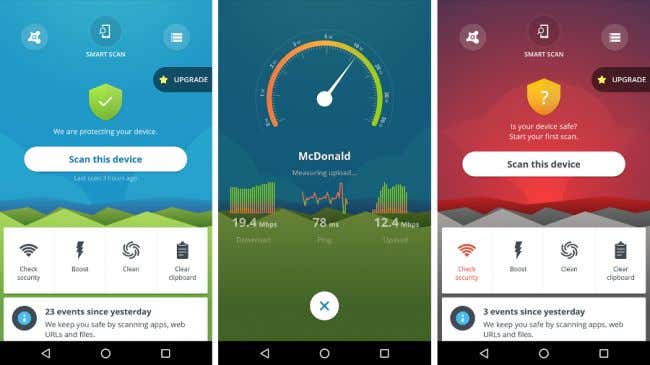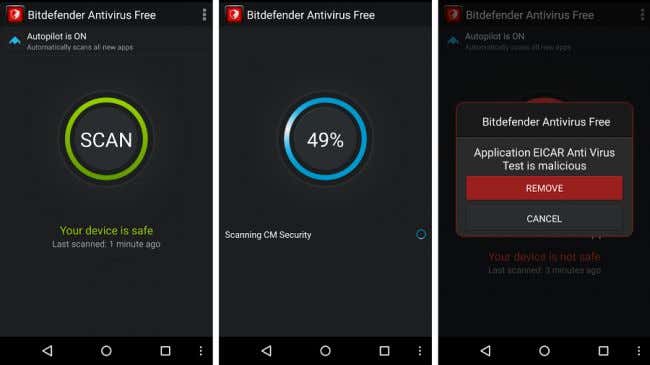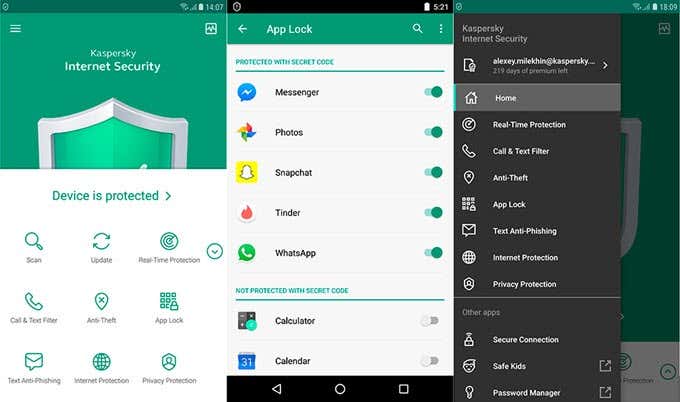It’s no wonder, then, that there are so many Android antivirus and security apps designed to protect you and your mobile devices from the ever-incessant perils out there trying to breach your smartphone, and therefore your privacy and your life.
Is Antivirus Enough?
As has always been the case with the most popular desktop OS, Windows, your Android device is under constant attack from viruses, malware, and other security threats designed primarily to steal your most private information, such as bank, credit card, and other credit sensitive data, and sometimes even your smartphone itself. Hence, not only is it critical that you protect your data, but it’s also crucial that you have options if somebody steals or otherwise gets possession of your phone – anti theft protection. Typically, antivirus apps scan your device, its software and incoming apps and data for threats and in turn annihilates them. They perform these functions and usually a few other security options, such as, say, blocking unwanted calls, for free. To add anti theft and other heftier security features, sometimes you’ll have to step up to a paid version, ranging from about $20 to $80, and sometimes not. Antitheft apps, of course, can’t actually prevent somebody from stealing your phone, or you from losing it. But what they can do is allow you to track your property, or, if it comes to this, lock it down or wipe it remotely, thereby thwarting any attempts to access and exploit your data. Some apps go so far as allowing you to completely disable or remove specific apps, such as, say, your banking and credit card apps, remotely. Other security features include watching your apps and flagging the ones that have permissions they don’t require, such as view your contacts, scan your call logs, locate you geographically, or send texts. If, for example, your phone or messaging app wants to access your contacts, that’s one thing, but if a silly little recipe-collecting app tries to peak at your private data, you should not only want to know about it, but will probably want to disable it. Another way smartphone thieves try to claim your data, and your device itself, is by replacing the SIM card. Many antivirus-security apps provide ways to thwart this, by either, upon detecting a SIM card change, locking the device, or by sending you the new phone number associated with the SIM card, thereby allowing you to send the coded messages required to launch anti theft measures to protect or wipe your data.
Overall Effectiveness
Normally, when compiling a roundup of products like this, early in the prep work I would install all these (and others up for consideration) products and run them through a series of performance and effectiveness benchmark tests. In this case, though, several third-party analysis and testing firms, including AV-Test, AV-Comparatives, MRG-Effitas, and others have already gone to great lengths to test these products. So, in addition to my testing and timing data, I relied heavily on independent, third-party benchmarking. I also analyzed the friendliness and overall usability of the user interfaces. What most of these products have in common, even those that didn’t make this list’s cut, is that they all work quite well. Unless otherwise noted in a product’s specific review below, all the products in this list, then, have passed performance tests, such as locating and neutralizing known threats, blocking malicious sites and links, and so on, with the highest percentages of accuracy among their peers. Sometimes, though, like with Norton Security and Antivirus, you must upgrade to the paid version to get the entire set of the top, most obvious and desired features. With the Norton product, for instance, you must upgrade to Norton Mobile Security to get the ability to scan and block malicious websites. In most cases, all these products’ free versions contain the basic antivirus protection you’d expect; I’ll let you know if and when they don’t.
If it’s on this List
Note that if an app has made it onto this list, I consider it a strong candidate for protecting your Android phone. The order, though, is alphabetical and has nothing to do with one product being better than the other. In other words, this list is not a hierarchy from best to worst or vice versa. That said, let’s get started.
Avast Mobile Security
Pros:
Free version includes firewall, antitheft, and call blocking App lockingVPN in premium version
Cons:
Ads in free version
Bottom Line:
The free version should be robust enough for most users, and stepping up to the premium version adds VPN and other significant features.
Versions:
Avast Mobile Security, comes with just about everything = freeAvast Mobile Security Pro, adds VPN, password management, and a few other features; one license is $40, three is $55, and five is $85, with a 10-license pack running about $14 per device.
A giant in the antivirus business, Avast products are well-known for performance and feature sets. The Avast Mobile Security free version comes with just about everything you need to keep your phone completely secure. This includes spam blocking, viruses and malware detection and removal, malicious app detection and virus removal, malicious web pages and links detection, Wi-Fi network security screening, anti theft protection (including taking a picture and audio of the thief with the Pro version), storage cleanup, RAM boost, battery consumption controls, and much more. Stepping up to the Pro version gets you, again, snapshots and audio of a potential thief, register and lock on SIM card change, VPN, protecting apps and media via PIN codes, and password management. Avast also monitors your usage to see what apps you use most of the time, determines which apps are better off used on a Wi-Fi (as opposed to phone data network) connection, and helps you determine how specific apps access specific aspects of your phone, such as, say, contacts, email, messages, and so on.
Bitdefender
Pros:
Low OS overheadMyriad Features, including antitheft, VPN, and ransomware protectionRemote Control and Monitoring
Cons:
Scans must be scheduled or initiated manually
Bottom Line:
Depending on the version you choose, Bitdefender is a huge, comprehensive antivirus and security mega-suite app.
Versions:
Bitdefender Antivirus Free Edition, works with Windows, macOS, and Android = FreeBitdefender Total Security 2019, protects up to five Android, Windows, macOS, and iOS devices for one year = $89.99 MSRP / $44.99 retail
An award winner by nearly every publication and organization that has reviewed it, Bitdefender is a powerful Android antivirus and security app. The free addition, of course, provides bare-bones antivirus and malware protection features, including behavioral detection to closely monitor your active apps, and when it detects anything suspicious, it takes instant action. Powerful scan engines ensure detection and removal of all malware, from viruses, worms and Trojans, and ransomware, zero-day exploits, rootkits and spyware. Bitdefender Total Security comes with just about every Android security feature available, including antitheft, device administrator, app lock, account privacy, and much, much more. If you enable it, there’s even a feature that takes a snapshot when somebody tries to guess your lock screen PIN. While you must schedule or initiate scans manually, which is what makes this app’s OS overhead so small, Bitdefender’s virus scans in my test are among the fastest in the business. App lock provides additional security on Messages, emails, and settings, as well as other apps you choose. It also protects you from fraudulent and malicious sites inside Chrome and several other browsers.
Kaspersky
Pros:
Excellent malware protectionProtect up to 20 devicesNumerous features include parental control, password management, VPN, and securityOnline dashboard for managing security
Cons:
Password manager could be more robustRequires several separate installations
Bottom Line:
Depending on the version you choose, Kaspersky is a full-featured, no-nonsense antivirus-security app that leaves little to be desired.
Versions:
Kaspersky Internet Security for Android, a robust feature set = Free Kaspersky Total Security, one device for one year for $14.95; three devices for one year for $24.95. There’s also multiplatform version that supports up to 20 Windows, macOS, Android, and iOS devices ($149.99 MSRP / $59.99 retail) The free Kaspersky version is one of the most robust I’ve seen and may be all you really need to protect your Android smartphone. Not only does it deliver powerful mobile antivirus and malware protection, but it also scans for dangerous apps and links, though you’ll have to initiate a $4-per-month update to get that. What does come with the free version is full-featured anti theft protection, including the ability to lock your phone or wipe it remotely if it’s stolen or lost. What’s missing in the free version, though, is the ability to set up automated scans for malware, anti-phishing protection for sites and SMS links, and a confidentiality feature that allows you to lock your apps with a code, as well as hide calls and texts from unauthorized users on your device. Kaspersky also makes Kaspersky Security Cloud, which lists for $149.99 and sells on the street for about 1/3 of that. With this product you get 20 Android, Windows, macOS, or iOS installs devices. Depending on the device, features and controls are extensive. Protection on your Android smartphone includes Wi-Fi network scanning, OS optimization, Unused Data Cleaner for removing unused apps, and a battery life saver and booster. It does not, however, provide antivirus protection. You have to install that separately with the free Android app discussed earlier. There’s also a Kaspersky Safe Kids option that filters content and monitors social media. And you can use the app to track your child’s location on his or her smartphone.
McAfee
Pros:
Inexpensive 10 license version available Checks for app data leakage Strong antiphishing supportRansomware protection
Cons:
Ads in free version
Bottom Line:
For households and businesses with many devices, McAfee AntiVirus Plus supports 10 Android, Windows, macOS, and iOS devices.
Versions:
McAfee Mobile Security for Android = Free McAfee Total Protection, come in three versions, one, five, and 10 licenses for Android, Windows, macOS, and iOS devices, for $29.99, $39.99, and $44.99 per year, respectively. A huge and trusted name in antivirus and security, McAfee’s offerings, whether you choose the standalone free Android version or the multiplatform Total Protection product, keep your devices protected. In addition to antivirus protection, the free version has extensive anti theft and device locator features, including the ability to snap a picture of the thief or somebody else trying to breach your smartphone. However, to get the ability to check for malicious sites, the app lock feature, Wi-Fi network protection, eliminate ads, and a media back up feature, you must step up to the Pro version, which runs $79.99, or $30 more than the multiplatform 10 device Total Protection package. Though you do get support for up to 10 Android devices with the Pro Android package. Stepping up to the multiplatform Total Protection product gets you, in addition to the features listed in the previous paragraph, ID theft protection, password management, ransomware protection, a firewall, McAfee Mobile Security, and more. If you have only one device to protect, however, by far the best deal is the $30 Total Protection package. While this is an excellent product, McAfee should take another look at its pricing logistics. In addition, during installation, somehow I managed to lock my McAfee online account before I finished setting it up, which added several frustrating steps to getting Anti Theft and other features that depended on my account working.
Norton
Pros:
Terrific antivirus and malware detection and removalLock your phone remotelyConsistently top scores during testingBuilt-in firewall Virus protection guaranteeVPNParental controlsOnline backup
Cons:
Requires upgrade for malicious site protection
Bottom Line:
Tons of features, including online backup, VPN, many security features, parental controls, and more, make Norton 360 a stalwart in antivirus and security products.
Versions:
Norton Mobile Security, provides extensive security, including anti theft and call blocking = free for 30 days then $29.99 (on sale for half that as I wrote this). Norton 360, comes in Standard and Deluxe ($79.99 MSRP / $49.99 retail, $99.99 MSRP / $59.99 retail), with the primary difference being that the Deluxe product supports up to five Android, Windows, macOS, or iOS devices. Also comes with 50GB of online backup space. Norton 360 with LifeLock Select, comes with everything in the previous product plus LifeLock Identity Theft protection and 100GB of backup space, for $149.99 MSRP / $99.99 retail. Certainly one of the first and probably the most well-known, Norton antivirus and security products have been around a long time and they work exceptionally well. While there is no “free” product, per se, the company does offer a 30 day trial of its Norton Mobile Security, or you can get it in a five-device bundle in Norton 360 Deluxe (which I’ve been using without issue for several years). In addition to antivirus protection you get the following features:
Online threat protectionAntitheft Cloud backupSmart FirewallPassword managerVirus protection guarantee Parental controlsVPNLifeLock FeaturesUS-based identity restorationLost wallet protectionMillion Dollar Protection PackageCredit monitoringSSN monitoring Data breach notifications
Granted, not everybody needs all this, and to get it all you must pay from $100 to $150 per year. Norton also promises that your devices will stay virus free or refund your money.
Conclusion
In addition to these five products, there are numerous others available, and settling on these wasn’t easy. Many of them are free. But, if you’re like me, with a household full of Android, Windows, and iOS devices, you’re far better off choosing one of the mega-bundles that provide multiplatform support. Be careful, though, even the best of these skimp on Apple device support. The good news is that macOS and iOS are closed architectures and therefore not so easily exploited, nor do they present nearly as large, jucy a target as do Android devices. In any case, be sure to check that the bundle you choose comes with the desired features on the platforms you use.






